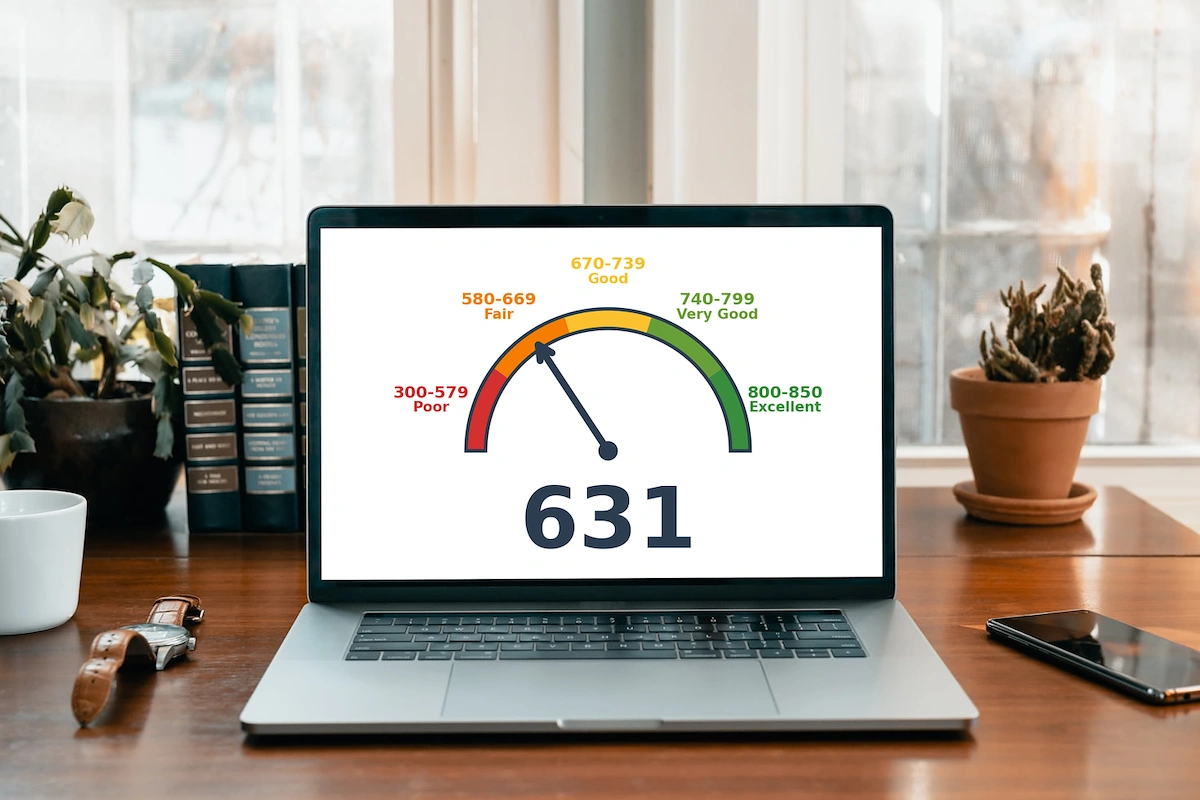
Kudos has partnered with CardRatings and Red Ventures for our coverage of credit card products. Kudos, CardRatings, and Red Ventures may receive a commission from card issuers. Kudos may receive commission from card issuers. Some of the card offers that appear on Kudos are from advertisers and may impact how and where card products appear on the site. Kudos tries to include as many card companies and offers as we are aware of, including offers from issuers that don't pay us, but we may not cover all card companies or all available card offers. You don't have to use our links, but we're grateful when you do!
631 Credit score: What You Need to Know in 2025
July 1, 2025


TL;DR
A 631 credit score is a solid starting point for building a stronger financial future. This score falls into the "Fair" category according to the FICO scoring model, putting you on the right track to accessing better financial products.
What Does a 631 Credit Score Mean?
A 631 credit score places you in the "fair" category on the FICO scoring model, which ranges from 300 to 850. While not considered a poor score, it signals to lenders that you may represent a moderate level of risk. This can affect your ability to secure loans or credit cards with favorable terms, potentially leading to higher interest rates or stricter borrowing conditions than someone with a higher score might receive.
However, a 631 score is a solid foundation to build upon. It indicates that you're on the path to better financial health, and with consistent effort, you can move into higher credit score ranges. Improving your score can unlock more attractive financial products and opportunities in the future, making it a worthwhile goal.
Who Has a 631 Credit Score?
Credit scores often show a clear trend with age, generally increasing as individuals get older. According to 2023 data from Experian, the average FICO score varies significantly across different generations:
- Ages 18-26 (Generation Z): 680
- Ages 27-42 (Millennials): 690
- Ages 43-58 (Generation X): 709
- Ages 59-77 (Baby Boomers): 745
- Ages 78+ (Silent Generation): 760
Credit Cards With a 631 Credit Score
A credit score of 631 places you in the "fair" credit range, which can be a mixed bag when applying for new credit cards. While you'll likely be approved for some cards, particularly those designed for credit-building, you may not qualify for premium rewards cards with the best perks and lowest interest rates. Lenders may view your score as a moderate risk, potentially leading to lower credit limits and higher annual fees than those offered to applicants with good or excellent credit.
Kudos can help you find the right card for your financial situation with its AI-powered tools, which analyze your spending habits to provide personalized recommendations. The platform also provides insights into how applying for a new card could impact your credit score, helping you make a more informed decision.
Auto Loans and a 631 Credit Score
A 631 credit score places you in the non-prime borrower category, which means you will likely be able to get an auto loan. However, you should be prepared for higher interest rates than those offered to borrowers with better credit.
According to an analysis of auto loan rates, the averages break down by credit score as follows:
- Super-prime (781-850): 5.25% for new cars and 7.13% for used cars
- Prime (661-780): 6.87% for new cars and 9.36% for used cars
- Non-prime (601-660): 9.83% for new cars and 13.92% for used cars
- Subprime (501-600): 13.18% for new cars and 18.86% for used cars
- Deep subprime (300-500): 15.77% for new cars and 21.55% for used cars
Mortgages at a 631 Credit Score
With a 631 credit score, you can qualify for several types of home loans. You meet the minimum credit score requirements for government-backed options like FHA, VA, and USDA loans. You also clear the bar for most conventional loans, which usually require a score of at least 620, opening up a variety of mortgage products.
However, your score will impact your loan terms. Expect higher interest rates compared to borrowers with stronger credit, making your loan more expensive over its lifetime. For conventional loans with a low down payment, you may also pay higher private mortgage insurance (PMI) premiums. While you can get a mortgage, you won't secure the most favorable rates.
What's in a Credit Score?
Understanding your credit score can feel like trying to solve a complex puzzle, as it's a blend of several key financial habits. The most common factors that determine your score include:
- Your payment history tracks whether you have paid past credit accounts on time.
- Credit utilization is the percentage of your available credit that you are currently using.
- The length of your credit history considers the age of your oldest account and the average age of all your accounts.
- Credit mix refers to the variety of credit products you have, such as credit cards, retail accounts, and loans.
- New credit inquiries and recently opened accounts can also temporarily impact your score.
How to Improve Your 631 Credit Score
No matter your starting point, it is always possible to improve your credit score and financial standing. With consistent effort and the right strategies, you can take control of your creditworthiness and build a healthier financial profile.
- Monitor your credit reports. Regularly checking your reports helps you spot and dispute any errors that could be unfairly dragging down your score. This also allows you to track your progress and ensure your positive actions are being recorded correctly.
- Set up automatic bill payments. Your payment history is the single most important factor in your credit score, so making on-time payments is non-negotiable. Automating payments ensures you never miss a due date, which is a critical step in rebuilding from a 631 score.
- Lower your credit utilization. This ratio compares your credit card balances to your total credit limits, and keeping it below 30% is ideal. Paying down balances or even making multiple payments per month can significantly lower your utilization and give your score a boost.
- Become an authorized user. If you have a trusted friend or family member with a strong credit history, being added to their account can help your score. Their positive payment history and low credit utilization can be added to your credit file, helping to improve your own profile.
Using a tool like the Kudos browser extension can also help you make smarter credit decisions while you work on improving your score.

Supercharge Your Credit Cards
Experience smarter spending with Kudos and unlock more from your credit cards. Earn $20.00 when you sign up for Kudos with "GET20" and make an eligible Kudos Boost purchase.
Editorial Disclosure: Opinions expressed here are those of Kudos alone, not those of any bank, credit card issuer, hotel, airline, or other entity. This content has not been reviewed, approved or otherwise endorsed by any of the entities included within the post.




























.webp)
.webp)

.webp)
.webp)
.webp)
.webp)
.webp)
.webp)
.webp)